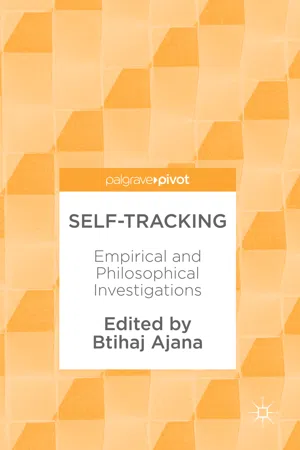Practices of self-tracking and quantification through digital technologies have become commonplace in recent years. With the rapid spread of apps and devices enabling the data capturing, monitoring and analysis of one’s daily activities, behaviours and habits, an increasing number of people around the world are embracing this growing culture of self-measurement and tracking in the spirit of improving their health , well-being, productivity and other aspects of everyday life . There are now over 160,000 self-tracking apps on the markets (Lupton 2016a, 1) and a broad collection of wearable devices such as Fitbit , Jawbone UP, Nike+ Fuel and Apple Watch . Intended to motivate users by encouraging a healthy lifestyle through daily monitoring, such devices and apps record a wide range of biometric data, health indicators and vital signs, including calories consumed, distances walked and hours slept. In fact, there are now apps and devices that can even scan our mood and emotions, our levels of stress and anxiety as well as our very intimate ‘sexual performance ’. Self-tracking is also not limited to health monitoring but extends to cover other aspects, including location tracking and the measurement of productivity and performance at the workplace.
Back in 2007, Gary Wolf and Kevin Kelly from Wired Magazine established a group under the name, the Quantified Self , a term that captures precisely these growing practices of digital self-tracking , promoting a new type of wisdom: ‘self-knowledge through numbers ’. Since its inception, the Quantified Self community has grown to include over 200 regular meet-up groups across more than 100 cities around the world. The term itself is now used to describe almost any form of self-tracking. 1 When the trend began, its followers were, as noted in the Economist (2012), ‘an eclectic mix of early adopters, fitness freaks, technology evangelists, personal-development junkies, hackers and patients suffering from a wide variety of health problems’. Now, and with the convergence of health apps and mobile devices, anyone with a smartphone , for instance, is likely to be engaged in one form of self-tracking or another, and oftentimes in a rather automatic and passive way (as is the case with of location tracking or Apple’s Health app that automatically tracks user ’s steps). Speaking of the notion of ‘lifelogging ’, another term for self-tracking , Selke (2016, 3) suggests that ‘the real lifelogging innovation is the automatic data collection that usually goes unnoticed in daily life […] the logger no longer has to make decisions because the system and its sensors constantly collect different data’.
To be sure, the idea of monitoring the body and its activities is not completely new, nor is the use of metrics to chart progress and goal attainment. As Carmichael (2010) reminds us, ‘[p]eople have been recording their lives in analog format ever since they started drawing on cave walls’. However, developments in digital technologies and sensors have made it easier than ever to automate the process of self-tracking and quantification , embedding this practice into everyday products such as mobile phones and watches. For the first time, Topol (2013) argues, we can digitise humans ‘in highest definition, in granular detail, and in ways that most people thought would not be possible’.
And in economic terms, measuring the body is becoming a very profitable industry. According to a report by BCC Research (2015), the global market for wearable self-tracking technologies reached US$3.2 billion in 2014. They expect this number to grow to US$18.8 billion in 2019. 2 The rapidly increasing market value of wearable tracking devices and apps is, itself, indicative of the growing interest in such technologies and the notable shift towards self-quantification and performance monitoring in general.
The impact of this growing phenomenon of self-tracking has been receiving much attention recently, as evidenced in the mass media coverage of these trends and in the rapidly developing body of literature from medical researchers, cognitive and behavioural psychologists, and social scientists. Much of this literature tends to celebrate digital self-tracking practices as emancipatory and empowering for both individuals and institutions (Swan 2012; Townsend 2013; Wei 2013; Topol 2013) . For the individual , it is often reported that the practice of tracking one’s physical activity and health indicators can have a positive impact on well-being (Fox and Duggan 2013) in the way it allows the user to set daily goals , monitor health habits and identify actions that are conducive to the betterment of fitness levels, health and life overall. Researchers in persuasive computing (for instance, Purpura et al. 2011 and Thieme et al. 2012) have also explored the motivational aspects and the ‘nurselike application’ (Singer 2015) of self-tracking devices and apps , given how these technologies are increasingly designed to playfully ‘prod’ the user to take action rather than just collect data.
For the wider health community, it is often postulated that self-tracking practices can play an important role in the advancement of medicine and health research in the sense that they can enable the capturing of quantifiable health data which can feed into decision-making vis-à-vis one’s lifestyle , diet options, exercise activities, performance and habits, while comparing these to the wider population. According to Rhodes (2014), ‘the immediate benefit of self-tracking data is that it can provide better measures of everyday behavior and lifestyle , filling the gaps in more traditional clinical data collection and presenting a more complete picture of health’. What this offers at the broader level of public healthcare is the promise to enhance risk management and analysis regarding health and illness and to stimulate a shift from an exclusive dependence on health professionals towards participatory and preventative models of health management (Swan 2012) .
The speculative benefits of self-tracking technologies and practices have also be...
